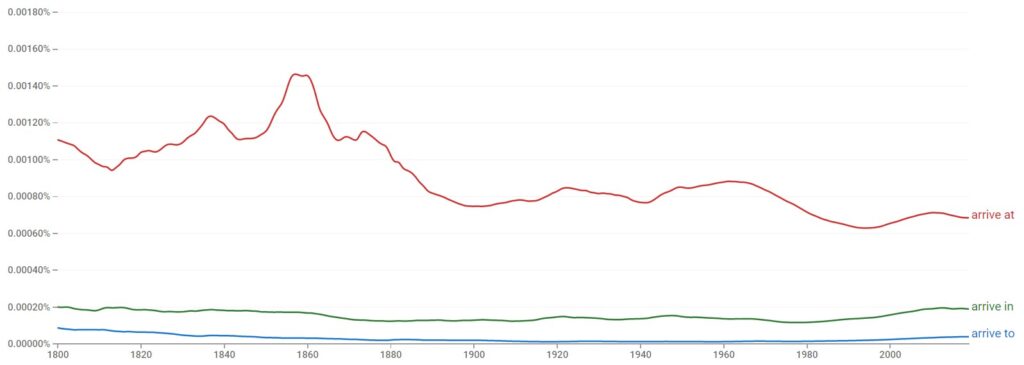This article on the subject of prepositions will explore the three phrases “arrive to”, “arrive at” and “arrive in”, and will discuss which are correct. With the use of helpful sentence examples, this guide should clarify the meaning of “arrive to”, “arrive at” and “arrive in”.
Is It “Arrive To”, “Arrive At”, Or “Arrive In”?
The phrases “arrive at” and “arrive in” are correct to use in a sentence, but the phrase “arrive to” is incorrect. “Arrive at” and “arrive in” are used in a sentence when discussing a journey and the process of reaching the end of the journey.

If the destination for the end of the journey is a specific point, the phrase “arrive at” should be used. If the journey’s final destination is a bigger place, the phrase “arrive in” is used.
The phrase “arrive to” should not be used in a sentence, because this phrase does not make sense in the sentence. A sentence containing “arrive to” sounds awkward even when read aloud. If the sentence sounds jarring or wrong to the ear, the chances are the sentence is probably incorrect.
What Does “Arrive To” Mean?
The phrase “arrive to” is an incorrect expression and does not make sense in a sentence. It, therefore, has no meaning. Do not use this phrase.
It is, however, a regular occurrence that even more advanced writers mistakenly use the phrase “arrive to” in their sentences.
To help you to understand that using “arrive to” in a sentence would be incorrect, take note of the sentence examples below containing the phrase “arrive to”. Notice how the following sentences are incorrect:
- Incorrect: I hope to arrive to Newcastle by mid-afternoon if the train is on time; perhaps we can meet for lunch?
- Incorrect: The train will arrive to Kings Cross train station by 3 pm; I will text you to let you know that I’m there safely.
- Incorrect: Karen says she will arrive to the town centre by tonight but would like to keep this a secret for now.
- Incorrect: The lorry containing the goods should arrive to the drop-off point later so the goods can be unloaded securely.
- Incorrect: I am traveling in Mum’s car; we should arrive to Katie’s house for the birthday party in good time.
What Does “Arrive At” Mean?
The phrase “arrive at” means the moment when a person arrives at a particular place and they have reached the end of their journey. This statement could be applied to vehicles as well as people.
An alternative meaning of the phrase “arrive at” is the expression meaning to come to a decision about a subject after a time of consideration.
To give you some ideas for how to use the phrase “arrive at” in your own sentences, take a look at the following examples of sentences including the phrase “arrive at”:
- I know when I first arrive at school I will find it hard to make friends; I am a quiet person and have always felt isolated.
- The number 46 bus should arrive at the bus stop in approximately 10 minutes depending on how busy the traffic is right now.
- When I arrive at work I might feel overwhelmed with the huge amount of tasks I have to accomplish this week.
- I hope to arrive at the bank after lunch so I can transfer the money for John’s school fees into your account.
- When I did not arrive at work the other staff began to worry, and several employees tried to ring my mobile number to find out where I was.
What Does “Arrive In” Mean?
The phrase “arrive in” means when an individual arrives at a particular location, like a city or country, for the first time to visit, stay, live or work.
Working out the meaning of the phrase “arrive in” can be tricky, but hopefully, these brief sentence examples should aid your understanding of this phrase:
- If the flight runs on schedule, we should arrive in Cyprus by mid-afternoon so we can check into the hotel.
- When I first arrive in the UK I think I will feel quite nervous and might struggle to make friends at school.
- When I arrive in New York I will probably be really hungry after such a long and tiring flight.
- I am excited to arrive in the city of London; I have never visited before, but I have heard so many great things about London.
- When I arrive in Portugal the first thing I want to do is sunbathe on the beach and take a cool swim in the ocean.
Are “Arrive To”, “Arrive At”, And “Arrive In” Interchangeable?
The phrases “arrive at” and “arrive in” are often used interchangeably in a sentence, because they are both used to describe the motion of reaching the end of a journey and coming to a destination. “Arrive to” is not used interchangeably because it is an incorrect phrase.
Indeed, the phrases “arrive at” and “arrive in” are used interchangeably, particularly in casual conversation, because they are so similar.
Is “Arrive To”, “Arrive At”, Or “Arrive In” Used The Most?
The phrase “arrive at” is used the most, in comparison to “arrive in” and “arrive to”.
As illustrated by this graph at Google Ngram Viewer the phrase “arrive at” is used considerably more. The red line represents “arrive at”, the green line depicts “arrive in” and the blue line shows the usage of “arrive to”.

The phrase “arrive to” is used the least and is hardly used at all, reinforcing the fact that this phrase is incorrect t0 use.
Is It Ever Correct To Use “Arrive On”?
The phrase “arrive on” can be correct to use in a sentence. The meaning of “arrive on” is different depending on the context of the sentence.
The phrase “arrive on” can be used to describe more about the manner in which a person has arrived at a destination or completed a journey. This could refer to the mode of transport, for example.
- I plan to arrive on horseback when we meet at the park on Sunday.
The phrase “arrive on” can also be used to detail a timeframe when the end of the journey will be reached.
- I should arrive on Saturday, but work commitments might mean that I have to regrettably travel next week instead.
You may also like: Will Arrive or Will Be Arriving – What’s the Difference?

Martin holds a Master’s degree in Finance and International Business. He has six years of experience in professional communication with clients, executives, and colleagues. Furthermore, he has teaching experience from Aarhus University. Martin has been featured as an expert in communication and teaching on Forbes and Shopify. Read more about Martin here.
